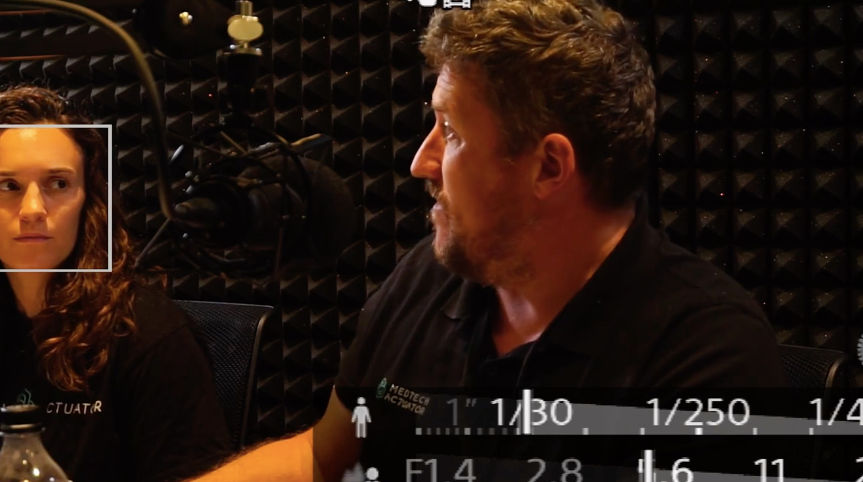Talking HealthTech: 329 – Where do healthcare founders go from here? Makenzie Thomas & Dr Buzz Palmer, MedTech Actuator

Source: talkinghealthtech.com

Provided by:
Talking HealthTech
Published on:
10 February 2023
Where do we go from here?
So, it’s 2023, and if you are in the game of creating health tech solutions, it feels a little bit like that sugar rush of capital and excitement has waned a little bit. Do you remember back in 2020 and 2021 when the world was hungry for innovative ways to deliver healthcare and had the money to do it?
Well, It kind of feels like the world’s a little bit in wait-and-see mode with investors and executives and clinic owners, but Australia still needs a lot of innovative tech solutions.
So, what are you doing?
Well, today, Pete is on his way from Sydney to Melbourne to chat with Dr Buzz Palmer and Makenzie Thomas from MedTech Actuator in Melbourne. In this episode, they talk about market dynamics, what’s changed since 2022 in healthcare and in startups, how to raise capital in these markets, where founders can find resource lists, and how a health tech startup can take off in 2023.
A MedTech Actuator Update
MedTech Actuator started in 2018 and is now entering its fifth year of operation. The company has a hefty portfolio from its flagship accelerator programme that had over sixty-six high-quality, exciting health-based startups passing through it. This year, MedTech Actuator will be launching cohort eight and applications are open now until March 3 at 11:59 pm.
Since 2018, the company has expanded quite a bit and is now working with other countries such as Singapore, Japan, Spain, India, Vietnam and multiple other European countries. MedTech Actuator is pushing the boundaries of medtech innovation in the regions and the Asia-Pacific. There is a huge hunting ground of opportunity within this region with a global context. As such, the organisation is trying to position itself as an Asia-Pacific organisation to drive innovation from clinicians, researchers, garage inventors etc., and capitalise that opportunity with programmatic elements.
MedTech Actuator was launched in Victoria, so it gets a lot of support from the Victorian government, LaunchVic and other partners. But there is plenty of opportunity here, as we’ve seen over the last few years; there is a general openness towards healthcare. People want to be more aware of and become more involved in healthcare. That is what makes Victoria such a good place, along with its open community- everyone is willing to participate, help and open up their black books of information.
The MedTech Actuator Programmes
MedTech Actuator runs a number of various programmes throughout the year in Australia and Singapore. These include:
-
MedTech Actuator Accelerator – this is the company’s main commercialisation vehicle that supports early-stage innovation coming out of medical spaces from just about anyone innovating in healthcare. MedTech Actuator provides a bespoke model of support for those teams during a twelve-month journey where the startups will run through intensive sprints to learn the ins and outs of medical commercialisation. and They also have access to investment opportunities, specific industry support and connections to mentors and industry partners, but also a community of founders who are doing the same thing. Applications are currently open for this programme, and the new cohort kicks off in May.
-
MedTech Actuator Origin – this focuses on where the founders come from and is a shorter programme that runs toward the end of the year. It is geared at helping people get acquainted with the innovation space so they can determine if the startup space is right for them. They can pressure test their ideas and take them to market, get a bit of feedback, learn the basics and figure out what the next steps are before they really dive into their startups.
-
Scholarship programmes for researchers – this programme is specifically for those in an academic setting who are thinking about commercialisation and getting into the market. They are taken through as they observe the entire process from the sidelines.
MedTech Actuator has a number of other programmes that it runs in Singapore. These look primarily at helping companies tap into international markets and create traction to scale internationally. Then they also run that in reverse- coming back to Australia, and they will be doing it in other places as well this year.
The Current Landscape for Healthcare Startups
There is no one answer for understanding the current sentiment in 2023 when it comes to startups and healthcare. There are a lot of predictions, but because it is a market cycle, for the next six months, we will see something a little different, such as ‘the tightening of belts,’ and there is already some evidence of this in the angel investment space.
But in healthcare, the advantage that the startups have is that they are driving impact. Consequently, a lot of family offices impact groups are now moving towards investment into startups rather than just philanthropy into startups. The venture capital space is also interesting, and though there is also a slowing of investment coming through that area, the startups in the MedTech Actutor’s programme are still raising fairly big sums.
This may be due in part to being prepared and having a good understanding of the market dynamics and what those venture capitalists are looking for, how they are looking for it and the time frames in which they are looking for it. So, that reduction in investments that is evident in the pre-seed and seed stages is not yet evident in the venture capital space.
The International Healthcare Startup Landscape
However, the sentiment is a bit different outside of Australia because of the way that governments are involved in some of those incentives in other regions. Here in Australia, there are some great sovereign funds that are slow and risk-averse, and the impact of those in the community is not quite evident just yet. But in other countries, like Singapore, there are initiatives that the government puts forward to support venture capitalists and angels to contribute to startups.
Japan is also quite interesting and has traditionally been a fairly closed market, and you find technologies in Japan that are only in Japan- they don’t have a global context. In the 1990s, Japan was the leader in technology; however, they have been overtaken by many other countries and, as such, have now opted to use a different approach. So, now there is a huge amount of influence from governments in the venture capital and angel spaces, including both capital and infrastructure incentives.
Additionally, in areas of Singapore and Japan, there is a much greater drive towards consumer med tech to support the idea that individuals are taking charge of their own healthcare. In Australia, there is some movement toward this type of consumer healthcare.
Is Remuneration Driving Health Tech in Japan?
Remuneration is not necessarily the primary driver of innovation in healthcare for Japan. Their high level of Innovation and adoption is possibly mainly based on the Japanese culture toward technology and how motivated they are about healthcare, especially because of their ageing population. They are aware of those potential challenges, possibly before the pandemic and are now looking to solve those and then turning to startups or innovation to resolve a lot of the problems.
Interestingly, the Japanese landscape is quite different in terms of risk aversion and attitude towards investment compared to that of Australia. Japanese startups like to go to IPO really early, and so going into that space, they are looking to exit their startups as soon as possible.
Where can Founders find Resources?
In addition to listening to podcasts like Talking HealthTech, founders can also check out What The Health for a number of resources, and these platforms also have awesome communities for finding like-minded people and forming connections. Also, depending on where you are within the startup journey, you can access particular programmes. At MedTech Actuator, they work with a lot of regulated devices, wearables and diagnostic tools used in allied health and hospital settings.
They have also expanded that definition to include health tech and a bit of biotech as the market has shifted. But if you have a disability tech, then it makes sense for you to turn to Remarkable, which is based in Sydney and specialises in that area. There are also female-led options, such as FemTech Collective. So, depending on where you fit and what you’re doing in the ecosystem, there are a lot of different resources out there that may suit you. Tap into the networks and tap into the people.
The MedTech Actuator Accelerator- Who, What, Why and Where
Essentially, the accelerator is open to anyone with a healthcare innovation that is at the TRL four-stage (early-stage bench testing). MedTech Actuator is looking for people who are able to identify that they have a good problem-solution fit. They don’t need to know everything or have fully formed pitch decks; however, they need to know who their customer is and understand the basics around what they are trying to take to the market.
A good candidate must also have an understanding that they need support and should be ready to learn and take what they have to the next level.
It is a twelve-month-long programme that allows for some flexibility. The first six months are done in sprints, using three days in the first week of every month. During that time, the programme focuses on everything from building a team to manoeuvring the regulatory pathway. The programme is basically a venture development accelerator, which means MedTech Actuator will teach you how to be an entrepreneur, how to be a founder and how to commercialise technology instead of just giving you the theory behind it.
If you want something that connects you to the industry, provides you with access to investment that is focused on healthcare and also has a group of health founders, then MedTech Actuator is a great option.
The Outlook for 2023
2023 is going to be a very exciting year regardless of the awkward market dynamics that year started with. The world is still coming out of this pandemic moment, so there is still a genuine appetite to draw down on opportunities within this space. We will see a drive in the adoption of technologies and the adoption of new opportunities in the healthcare space.
The investment space will be a little bit drier, and we just have to accept the fact that in the next few months, there will be a bit of turmoil and uncertainty. As such, founders need to broaden their expectations and their access and open up new networks as well.


